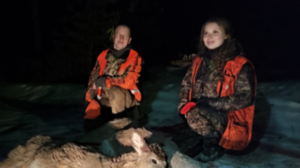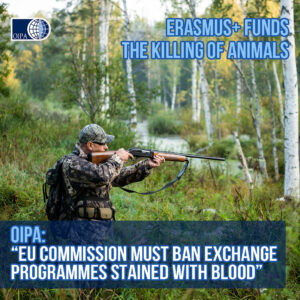The first international exchange programme for young hunters, promoted by Erasmus+, took place in Varsinaris-Suomi from 3 to 8 February 2023. Seven young people between 16 and 29 years old from Finland, Estonia and Sweden joint the initiative, supported by local hunters and organizers.
 An entire week of theoretical and practical lessons on hunting, including several hunting trips for different species. During the programme, participants learned to shot and kill white-tailed deer, foxes, raccoon dogs and ducks in the areas of Alastaro, Virttaa and Pöytä, where young Finns tutored the visiting students. Additionally, participants practised den hunting of small mammals, visited a weapon factory, an army shop and a hunting museum, and took some sessions at the shooting range. According to the report published here, the week ended with a wild game cooking lesson and a new hunting opportunity for those who had not yet shot a white-tailed deer.
An entire week of theoretical and practical lessons on hunting, including several hunting trips for different species. During the programme, participants learned to shot and kill white-tailed deer, foxes, raccoon dogs and ducks in the areas of Alastaro, Virttaa and Pöytä, where young Finns tutored the visiting students. Additionally, participants practised den hunting of small mammals, visited a weapon factory, an army shop and a hunting museum, and took some sessions at the shooting range. According to the report published here, the week ended with a wild game cooking lesson and a new hunting opportunity for those who had not yet shot a white-tailed deer.
Erasmus+ is the EU’s programme to support education, training, youth and sport in Europe. The programme is managed by the European Commission (the EU’s executive body) the European Education and Culture Executive Agency (EACEA), a series of National Agencies in Programme countries, and a series of National Offices in some Partner countries.
The European Commission is ultimately responsible for the running of the Erasmus+ Programme. It manages the budget and sets priorities, targets and criteria for the Programme on an on-going basis. Furthermore, it guides and monitors the general implementation, follow-up and evaluation of the Programme at European level. The European Commission also bears the overall responsibility for the supervision and coordination of the structures in charge of implementing the Programme at national level.

OIPA has sent an open letter to the EU Commission President Von der Layen and to the EACEA Director Sophie Beernaerts, expressing deep concern on how these kind of initiatives can improve the quality of education and training in Europe, which is supposed to be the main objective of the Erasmus programme. Our organization is also wondering how the European Commission can consider ethical and educational a programme aimed to teach young people to kill defenceless sentient beings, moreover spending public money from taxpayers, whose vast majority is against hunting.
The killing of defenceless animals is harmful, not educative, and contrary to the principles of biodiversity conservation, which the Commission itself also pursues with the Biodiversity Action Plan, which aims to protect nature and reverse the degradation of ecosystems and the loss of biodiversity in Europe by 2030.
The decision to guide new generations towards principles of union, cooperation and inclusion employing programmes and activities that involve the killing of other living beings is the most senseless and educationally harmful action the EU could propose to its citizens.
OIPA has formally called on the European Commission to take immediate action and ban these type of exchange programmes, stained with blood, from any projects funded by the European Commission in all EU member states.
Read our letters:
ERASMUS PLUS_OIPA_OPEN_LETTER_MARCH_2023_VON_DER_LAYEN
ERASMUS PLUS_OIPA_OPEN_LETTER_MARCH_2023_Sophie Beernaerts




